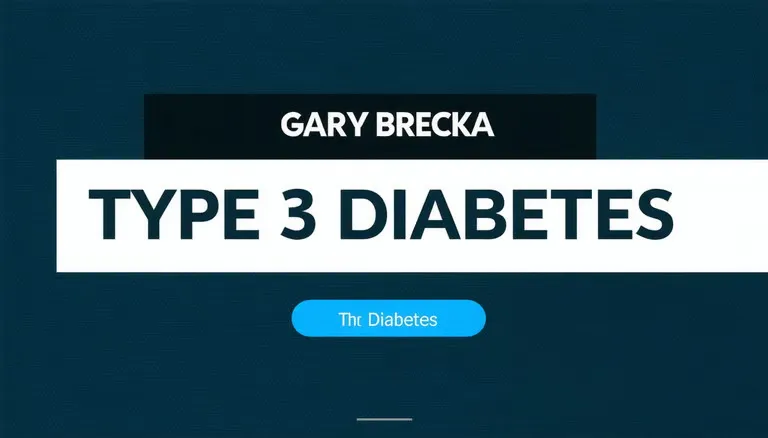How Gary Brecka Tackles Type 3 Diabetes with Smart Choices
Discover how Gary Brecka tackles type 3 diabetes with smart choices. Dive into his diabetic insights now!
Understanding Diabetes Types
Before diving into Gary Brecka’s diabetes approach, let’s talk about the different diabetes types. Knowing this sets the stage for appreciating his take on managing Type 3 Diabetes (T3D).
Differentiating Type 1 and Type 2
Type 1 and Type 2 diabetes are like two sides of the same coin, yet they come with their quirks. Type 1 is an early bloomer, showing up in kids or teenagers, though it’s not shy about appearing later. It’s essentially a case of mistaken identity, where the immune system turns against insulin-making cells in the pancreas.
On the other hand, Type 2 is the headline-grabber, popping up mostly in adults over 40 but sneaking into kids’ lives too. Here, the body’s on strike – insulin’s not getting the respect it deserves, so sugar hangs around in the blood like an unwanted guest. This happens because the pancreas is not cranking out enough insulin, and the cells are playing hard to get with it (Mayo Clinic).
| Diabetes Type | When it Hits | Why it Comes | Insulin Situation | How Common? |
|---|---|---|---|---|
| Type 1 | Youngsters/Teens | Immune system gone rogue | Nada | Less frequent |
| Type 2 | Grown-ups, inching into childhood | Insulin shortfall/site-block | Not enough or ignored | All over the place |
Type 3 Diabetes
Link Between Diabetes and Alzheimer’s
Gary Brecka has made big moves in figuring out and addressing Type 3 diabetes, often linked to Alzheimer’s. This condition features brain insulin resistance, potentially leading to neurodegeneration like Alzheimer’s.
Research suggests Alzheimer’s mirrors a brain-specific insulin resistance issue (Mayo Clinic News Network). Calling it “Type 3 Diabetes” highlights the brain’s struggle with insulin and glucose metabolism.
Type 3 Diabetes is a term folks are tossing around to describe this brainy theory: there’s a connection between how we handle insulin and how our brain functions. Apparently, if our brains don’t use insulin like they should, we might be in for some memory trouble and diseases like Alzheimer’s. Simply put, it’s about how insulin resistance might be playing tricks on our think-cap, leading it down a slippery slope toward dementia.
Studies have shown quite a link between Type 2 Diabetes (T2D) and Alzheimer’s. One review in 2022 mentioned that if you’ve got T2D, you’re 45% to 90% more likely to face Alzheimer’s or dementia’s unwelcome cousin, vascular dementia. With over 100,000 folks taking part in this study, it’s big news for how we tackle diabetes to stave off the bad stuff in our brains.
Keeping diabetes in check means more than just managing your blood sugar—it’s about giving your brain a fighting chance too. Insulin resistance in your brain could potentially be a trigger for Alzheimer’s. Some recommend sticking to healthy insulin levels through solid eating plans and lifestyle changes, like the ones Gary Brecka lays out in his guidelines.
Trouble Caused by Brain Insulin Resistance
When the brain struggles with insulin, it can wreak havoc on neuron health and thought processes. Normally, insulin helps neurons get the glucose they need to keep the brain ticking. But for those with Type 3 diabetes, insulin just isn’t cutting it, causing all sorts of problems.
Here’s the fallout of insulin resistance in the brain:
- Neurons don’t get enough glucose.
- There’s a jump in oxidative stress.
- Neuroplasticity takes a hit.
- Inflammation ramps up.
| Factor | Normal Brain | Type 3 Diabetes Brain |
|---|---|---|
| Glucose Uptake | A-Okay | Not so much |
| Oxidative Stress | Chill | Off the charts |
| Neuroplasticity | Just fine | Not so good |
| Inflammation | Manageable | Fire alarm level |
These disruptions may help explain the cognitive loss seen in Alzheimer’s. Gary Brecka really pushes for changes to diet and lifestyle to combat Type 3 diabetes. Understanding this insulin-Alzheimer’s link, he stands behind methods that support insulin efficiency and safeguard brain power.
Curious about Gary Brecka’s other diabetes insights? Head over to gary brecka diabetes to see his dietary advice in action—also available at gary brecka diabetes diet.
If you want more on his strategy for different diabetes types, don’t miss our pieces on gary brecka type 1 diabetes and gary brecka type 2 diabetes.
Mechanisms of Type 3 Diabetes
Getting a grip on Type 3 Diabetes (T3D) isn’t just fancy terminology; it’s a game-changer in understanding how Gary Brecka’s approach tackles this mind-boggling condition. T3D throws a wrench in the brain’s usual works, messing with insulin signals, sugar intake, and how the brain rewires itself.
Brain Insulin Signal Jam
When T3D rolls in, it’s like a static on your TV; the insulin signals in the brain go all fuzzy. Insulin’s role as the glucose gatekeeper for neurons is blocked, leaving them starved of their precious fuel, which spells trouble for brain function. This traffic jam in insulin signaling can kick off issues you might associate with diabetes and memory problems, including a bad temper and forgetfulness (International Journal of Molecular Sciences).
| Problem | Effect |
|---|---|
| Jammed Insulin Signals | Glucose Shortage in Neurons |
| The Fallout | Memory Problems, Alzheimer’s |
Neurons’ Sweet Tooth Malfunction
In the world of T3D, neurons seem to shy away from glucose like it’s the plague because they just can’t absorb it well, thanks to resistance against insulin. This glucose drought throws a wrench in cognitive gears, leading to neurotransmitter shortage and neurons struggling to keep up with their usual plastic energy demands.
| Job | What Happens When It Breaks |
|---|---|
| Neurons’ Sweet Tooth | Energy Crash, Neurotransmitters Drop |
| Impact | Brain Fog, Memory Meltdowns |
Brain Flexibility and Fuel Mix-up
Neuroplasticity, or the brain’s way of rewiring itself, thrives on a good energy supply. With T3D, though, glucose metabolism takes a hit, throwing off the brain’s mojo and adaptability (International Journal of Molecular Sciences).
| Mechanism | Consequence |
|---|---|
| Blocked Neuroplasticity | Stubborn Thought Processes, Cognitive Dips |
| Energy Mix-up | Neuronal Crash |
Gary Brecka’s fresh perspectives aim to straighten out these wrinkles, poking at the very core of T3D with smart diet tips and tweaks in lifestyle. By tackling brain insulin resistance, boosting sugar uptake by neurons, and supporting that ever-flexible brain, these steps can make a noticeable dent in T3D.
Treatment Insights for Type 3 Diabetes
Gary Brecka is digging into fresh treatments for Type 3 Diabetes, spotlighting the newest research and savvy choices to help manage this sneaky condition.
Exploring Insulin Nasal Spray
Ever heard of insulin up your nose? Sounds weird, right? But that’s exactly what scientists are looking into for tackling Type 3 Diabetes. This method aims straight for the brain, skipping over the usual barriers, hoping to boost memory and learning skills, especially in those dealing with Alzheimer’s (Mayo Clinic News Network). Trials are showing some good news with better brain function with this spray technique.
| Treatment | Method | What It Might Do |
|---|---|---|
| Insulin Nasal Spray | Shoots right to brain | Better memory and learning |
Unpacking the APOE4 Variant
A fresh take from brain buff Dr. Guojun Bu at Mayo Clinic is connecting the dots between the APOE4 gene and Type 3 Diabetes. This gene throws a wrench in the works by messing with how insulin is processed in the brain. It’s a big player in the memory loss and brain slow-down game (Mayo Clinic News Network).
| Gene Variant | How It Messes Things Up | Tied to These Issues |
|---|---|---|
| APOE4 | Scrambles brain insulin work | Alzheimer’s, Type 3 Diabetes |
APOE4: The Brain’s Villain
The study digs into how APOE4 goes head-to-head with insulin receptors on brain cells, muscling out the usual APOE3. This takeover blocks the signals the brain needs, starving cells and messing with memory and thinking (source).
| Protein | What’s The Deal | Fallout |
|---|---|---|
| APOE4 | Hogging insulin spots | Signal mess-up, brain hunger |
| APOE3 | Plays fair with receptors | Normal brain signals |
For more on Gary Brecka’s tactics in tackling diabetes, peek at our Gary Brecka diabetes piece.
Image Credit







Leave a Reply